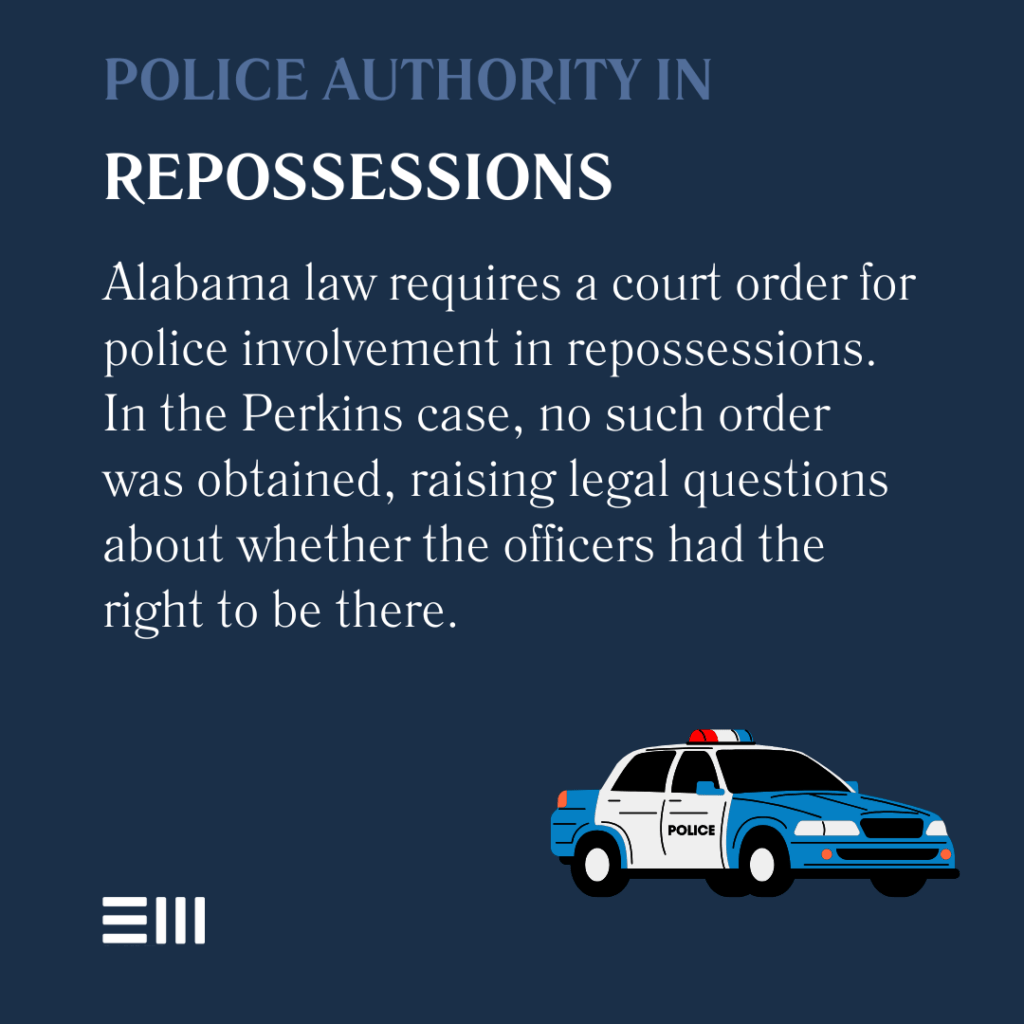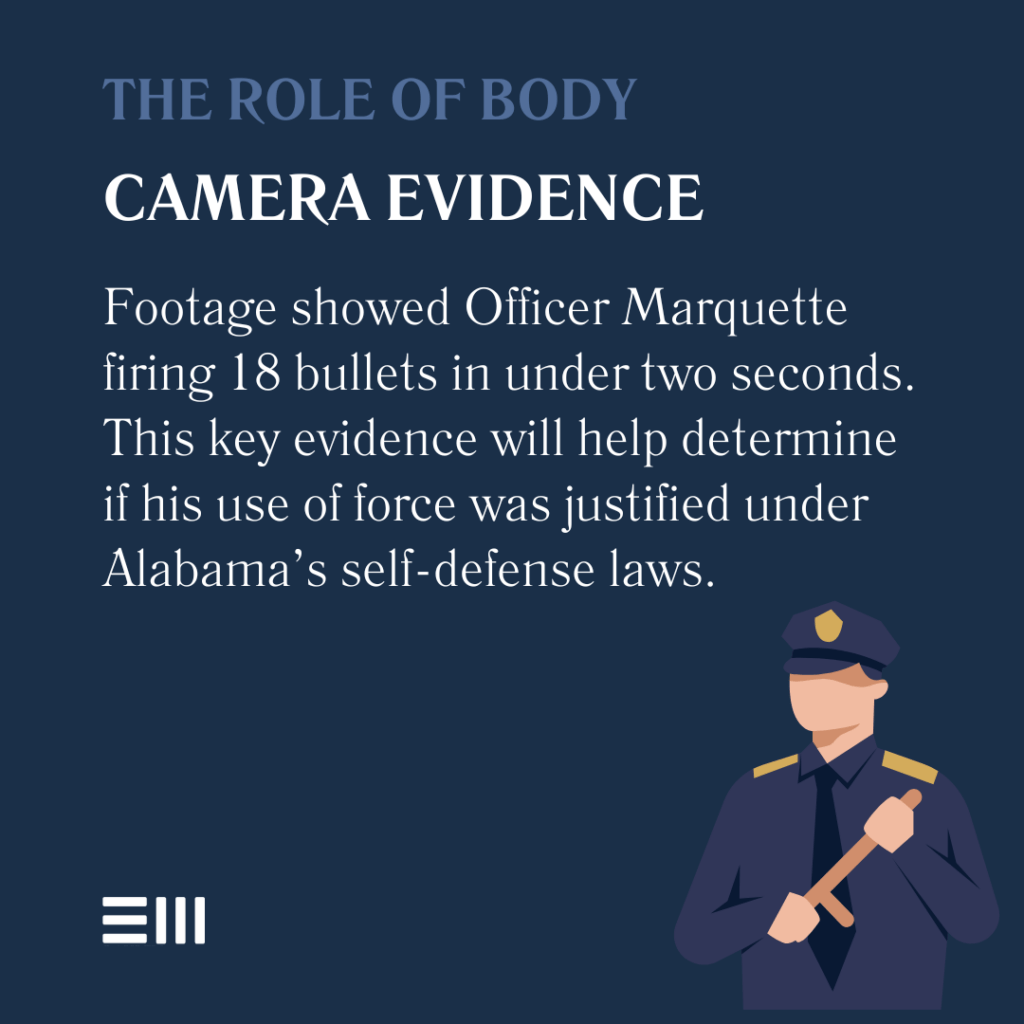
A significant legal ruling in Montgomery, AL could have far-reaching implications for personal injury cases involving law enforcement in Alabama.
On Monday, Morgan County Circuit Judge Charles Elliott denied immunity to police officer Mac Marquette, who is charged with murder in the September 29, 2023, fatal shooting of Steve Perkins.
The case centers around a late-night confrontation that occurred when Marquette accompanied a tow-truck driver attempting to repossess Perkins’ pickup truck. Body camera footage revealed Marquette fired 18 bullets less than two seconds after identifying himself as law enforcement.
The Legal Framework: Alabama’s “Stand Your Ground” Law
The case highlights the complexities of Alabama’s “stand your ground” law, which grants immunity from prosecution to individuals who use deadly force if they are in a place they have a right to be and reasonably believe they are in danger.
In his ruling, Judge Elliott determined that a jury must decide several critical questions:
- Whether Marquette was “acting in his capacity as a police officer” during the incident;
- Whether Marquette was legally authorized to be present at Perkins’ property; and
- Whether a “reasonable” officer would have used deadly force in the same situation.
These questions will be central to determining whether Marquette can claim any legal protections typically afforded to law enforcement officers.
Unauthorized Police Presence During Repossession
One of the central legal issues in this case involves Alabama law regarding police involvement in repossessions. According to Judge Elliott’s ruling, Marquette wasn’t legally authorized to assist the tow-truck driver based on Alabama law that requires a court order for law enforcement involvement in repossessions.
The facts presented in court revealed:
- Tow-truck driver Caleb Combs was authorized by Perkins’ creditor to repossess the truck due to missed payments;
- Marquette and two other officers (Joey Williams and Christopher Mukadam) were dispatched after Perkins allegedly pointed a gun at Combs during an initial repossession attempt;
- The officers positioned themselves covertly around Perkins’ house while Combs returned for a second repossession attempt; and
- No court order was obtained authorizing police involvement in the repossession.
These circumstances led the judge to question whether the officers were acting within their legal authority when they arrived at Perkins’ property.

Body Camera Evidence and Use of Force Standards
Judge Elliott’s ruling cited body camera footage showing Marquette “unloaded all the bullets in his gun less than two seconds after he emerged from where he was hiding.”
The judge noted that Perkins turned to face Marquette and “briefly tried to move his gun away from the officer before Marquette started shooting.”This evidence will be crucial for the jury in determining whether Marquette’s use of force was reasonable under the circumstances.

Legal Determination: Officer as “Trespasser”
In a noteworthy aspect of the ruling, Judge Elliott determined that because there was no active crime scene when the officers arrived, Marquette was “acting outside of the scope of his authority” and was “therefore a trespasser” when he waited outside Perkins’ house.
This determination raises significant questions about:
- The boundaries of police authority during property repossessions;
- When officers can claim self-defense immunity; and
- The standards for reasonable force in confrontations with armed homeowners.
These legal questions will likely influence future cases involving police actions during civil matters throughout Alabama.
What This Case Means for Alabama Residents
This case highlights several important legal principles that affect Alabama residents:
- Property owners have substantial legal protections even during repossession situations;
- Law enforcement requires proper legal authorization to participate in civil matters like repossessions;
- “Stand your ground” immunity is not automatically granted, even to police officers; and
- Body camera evidence plays an increasingly critical role in determining the legality of police actions.
The case, which is scheduled for trial in June (unless the defense successfully appeals to state appellate courts), will likely establish important precedents regarding police liability and homeowner rights in Alabama.
Legal Implications for Personal Injury Cases
For individuals who have experienced injuries during police encounters, this ruling underscores several important legal considerations:
- The specific authority under which officers are operating matters legally;
- Officers must be acting within the scope of their legal duties to claim certain immunities;
- Evidence like body camera footage can be decisive in determining liability; and
- Alabama courts will carefully examine claims of self-defense, even from law enforcement.
This case demonstrates that Alabama courts are willing to scrutinize police conduct and hold officers accountable to the same legal standards as civilians when appropriate.
Get Expert Legal Advice for Complex Cases
If you or a loved one has been involved in a situation involving questions of property rights, police authority, or personal injury, having knowledgeable legal counsel is essential for protecting your rights and interests.
At Baxley Maniscalco, our experienced personal injury attorneys understand the complex legal issues at play in cases involving law enforcement and property rights. We work diligently to ensure our clients receive fair treatment under the law and appropriate compensation for injuries or wrongful deaths.
Our team is ready to review your case and provide the skilled representation you need during challenging legal situations.
Contact us now for a confidential consultation.
Can't find what you're looking for? Search our site below.










